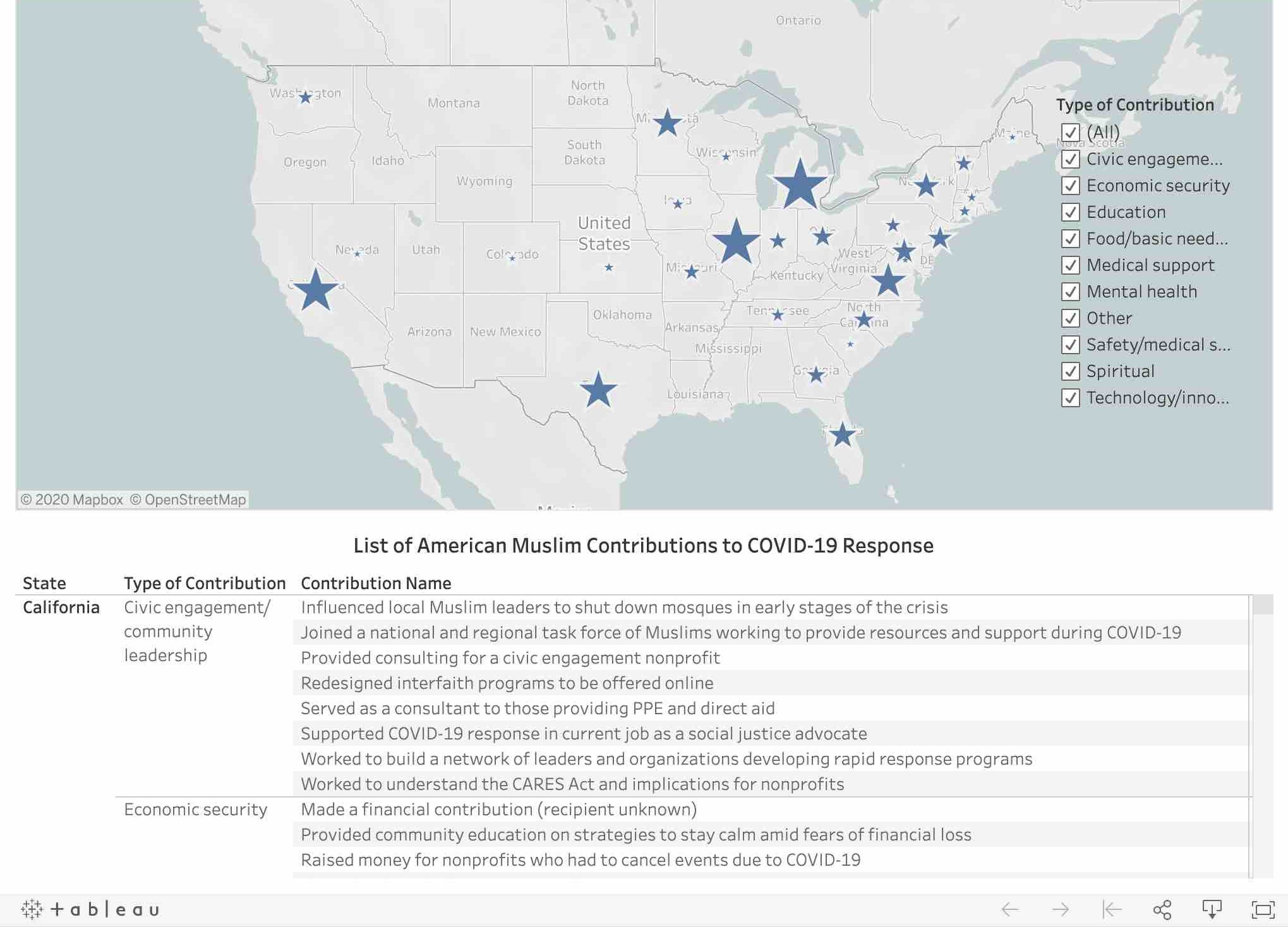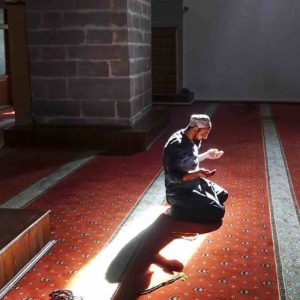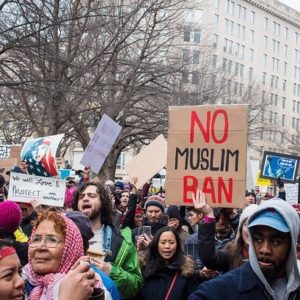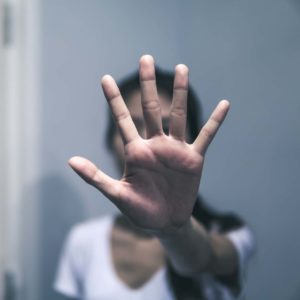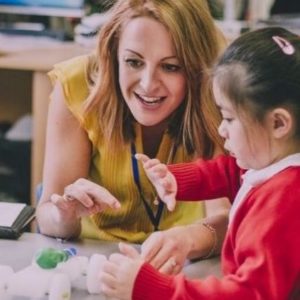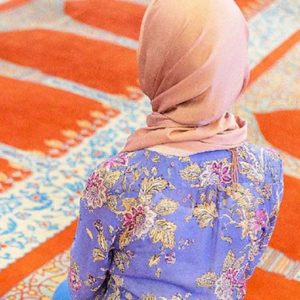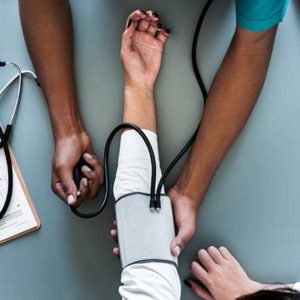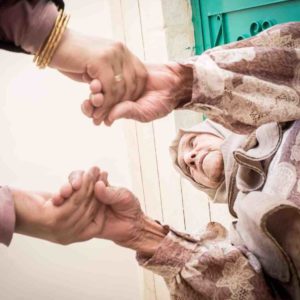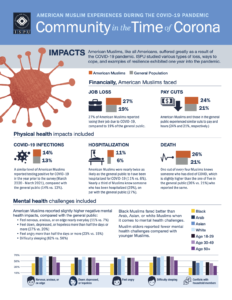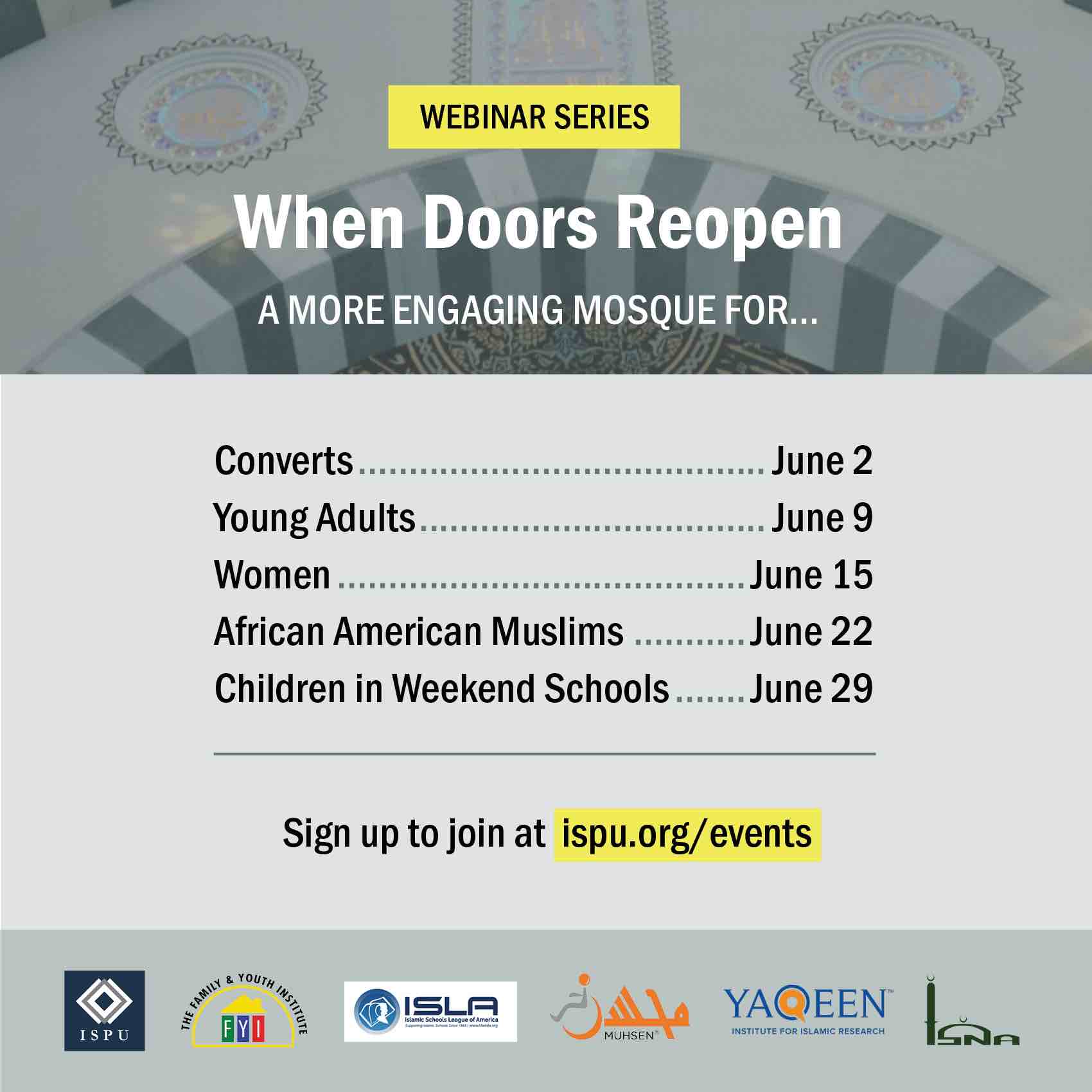The emergence of COVID-19 in the United States has profoundly altered American life. Mandated social distancing has led to school and work closures, rising unemployment, and much more time spent at home caring for the health and well-being of family members. During these anxious times, ISPU’s research can help guide and inform. This toolkit rounds up new events and relevant research that inform our current national moment.
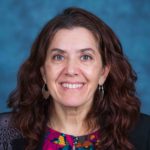
A MESSAGE FROM THE EXECUTIVE DIRECTOR
Just like all of you, we are watching the COVID-19 challenge play out on an almost hourly basis. Like all of you, we are trying to balance concern for the health and safety of our team, our supporters, and our partners with the need to continue our vital work. Luckily, much of ISPU’s work can be done remotely.
We’re thinking of all of you who have done the right thing and decided to socially distance as much as possible, those who are suddenly teaching children and caring for others in your home, and those whose work requires suiting up, showing up, and putting yourself in harm’s way to assist all of us—healthcare personnel, first responders, social service providers, delivery drivers, mail carriers, grocery store employees, and so many others.
As for us at ISPU, we have ramped up our virtual research-sharing opportunities to keep you engaged with learning opportunities during our time at home. We are also equipping leaders to tackle the current challenges and pave the way for a better future. Lastly, we are collecting data so that when we emerge from this crisis, we will be able to learn from it.
While we have cancelled or postponed all of our live research-sharing and donor events, we still want to keep in touch in a safe way. So, if you’re not already, follow what we’re up to via Facebook, Twitter, Instagram, and our email newsletter. And bookmark our calendar for event updates on new webinars and other virtual opportunities.
Meira Neggaz
ISPU Executive Director
COVID-19 Toolkit
Resources for Online Learning, Community Support, and Mental Health Maintenance
The emergence of COVID-19 in the United States has profoundly altered American life. Mandated social distancing has led to school and work closures, rising unemployment, and much more time spent at home caring for the health and well-being of family members. During these anxious times, ISPU’s research can help guide and inform. This toolkit rounds up new events and relevant research that inform our current national moment.

A MESSAGE FROM THE EXECUTIVE DIRECTOR
Just like all of you, we are watching the COVID-19 challenge play out on an almost hourly basis. Like all of you, we are trying to balance concern for the health and safety of our team, our supporters, and our partners with the need to continue our vital work. Luckily, much of ISPU’s work can be done remotely.
We’re thinking of all of you who have done the right thing and decided to socially distance as much as possible, those who are suddenly teaching children and caring for others in your home, and those whose work requires suiting up, showing up, and putting yourself in harm’s way to assist all of us—healthcare personnel, first responders, social service providers, delivery drivers, mail carriers, grocery store employees, and so many others.
As for us at ISPU, we have ramped up our virtual research-sharing opportunities to keep you engaged with learning opportunities during our time at home.
While we have cancelled or postponed all of our live research-sharing and donor events, we still want to keep in touch in a safe way. So, if you’re not already, follow what we’re up to via Facebook, Twitter, Instagram, and our email newsletter. And bookmark our calendar for event updates on new webinars and other virtual opportunities.
Meira Neggaz
ISPU Executive Director
Documenting the American Muslim Response to the COVID-19 Crisis
ISPU set out to document stories of service from American Muslims in the fight against COVID-19. This report includes a quantitative measurement of service in each state, collected via survey and including everything from providing healthcare workers with mental health support to donating much-needed funds to meet the basic needs of families who have been hardest hit by the crisis. It will also include stories of individuals and communities that took action to alleviate or prevent the suffering around them. This collection of contributions will serve as a living document, recording the story of American Muslim impact during this unprecedented moment in history.
Explore acts of service by state and category, then add your own!
Relevant Resources
Mental Health of Muslim Healthcare Workers During COVID-19
To understand how American Muslim healthcare workers (HCWs) in the United States have been impacted by this stress, and how they have coped with it, this study surveyed nearly 700 American Muslim HCWs about one year into the pandemic. Results include the impact of the COVID-19 pandemic and religious and racial discrimination on mental health, as well as an investigation into “healthy” and “unhealthy” coping strategies.
This report was co-published in April of 2022 by the Institute for Social Policy and Understanding (ISPU) and the Stanford Muslim Mental Health & Islamic Psychology Lab.
Reimagining Muslim Spaces—Virtually
For the protection of their communities, many mosque leaders have made the difficult choice to close houses of worship during this crisis. This time can be used to reflect on how these institutions can operate when they reopen, through virtual task forces and working groups. This ISPU resource provides research-backed recommendations to make mosques and Islamic centers welcoming, well-governed sources of community service. We encourage you to send these resources to your mosque leader, follow and ask questions during our weekly #MindfulMonday posts on Facebook, and sign up for our newsletter for more information. How will the shift of religious gatherings from public to virtual spaces impact faith groups? ISPU’s analysis of private vs. public expressions of faith may provide insight into how Muslims express their faith.
Coalition Building in the Time of Coronavirus
ISPU research reveals that Islamophobia is just one branch on a larger tree of bigotry that includes racial discrimination. Not only do 18% of American Muslims identify as Asian, but all Muslims experience structural and societal Islamophobia on the basis of race and religion. During this time of reported heightened anti-Asian bigotry and bias incidents, we’re sharing our data on coalition-building to combat all forms of discrimination in tandem.
Social Challenges Exacerbated by COVID-19
ISPU’s research on domestic violence and poverty is newly relevant as unemployment numbers skyrocket and abused persons are isolated alongside their abusers. Our research provides insight and analysis into both issues, newly exacerbated by COVID-19.
Protecting Mental Health
For many, social distancing can lead to isolation, separation from community, increased caretaking responsibilities, and limited access to health care. Now more than ever, taking care of mental health is essential. This toolkit includes resources for individuals and mental health professionals to effectively address the unique mental health challenges that Muslims face.
Supporting Educators
The closure of schools means many caretakers are now in the position of administering remote education for their children, organized by educators now removed from a classroom setting. During this unprecedented upset to educational systems, teachers and administrators may have additional time to seek professional development or need more help accessing resources like handouts, videos, bibliographies, and other assets. This toolkit offers those resources to both educators and parents involved in their child’s education, and is perfect for sharing with your schools teachers and administrators.
ISPU | Yaqeen Talk Toolkits
As most mosques and community centers close in an attempt to limit COVID-19 exposure, those seeking spiritual nourishment have the opportunity to find new outlets online. ISPU | Yaqeen Talk Toolkits offer a series of research-packed khutbahs in written and video form. From civic engagement to combatting community racism, these khutbahs feature ISPU research through Yaqeen Institute’s faith-informed lens.
Muslims on the Healthcare Front Lines
ISPU has a plethora of data on the impact of Muslims both working in healthcare and responding to healthcare crises. As we move through the challenge of COVID-19, return to ISPU’s analysis of how Muslims responded to the Flint Water Crisis. Then explore ISPU’s Muslims for American Progress publications, which quantify the impact of Muslim Michiganders and New Yorkers. Muslim New Yorkers comprise more than 9% of the city’s medical doctors and more than 12% of the state’s pharmacists. In New York City, the epicenter of the American COVID-19 crisis, Muslim doctors see over 5 million patients, and Muslim pharmacists fill close to 9.6 million prescriptions per year. In Michigan, while Muslims represent just 2.75% of Michigan’s total population, they make up more than 15% of the state’s licensed medical doctors, providing 1.6 million appointments to patients and filling 15 million retail drug prescriptions per year. Dive into our research findings from MAP to understand the deep impact Muslim healthcare workers will have on the front lines of this challenge.
American Muslims and Aging
Research shows COVID-19 is particularly dangerous to our aging population, a group already at risk for many challenges. ISPU’s research on American Muslims and aging provides recommendations for service providers, policymakers, religious leaders, community-based funders, and elders and their families that cover a wealth of ways to support the growing population of older adults. As we work to protect elders from the impact of COVID-19, this resource will help address their needs holistically.
Infographic: Community in the Time of Corona
This downloadable infographic provides a visual representation of key elements and topics covered in the Community in the Time of Corona report. Read about the impacts of COVID-19, coping strategies, and how American Muslims exhibited resilience and strength during the pandemic.
Digital Learning Events
New Webinars on Current Challenges
While all of our in-person research-sharing events have been cancelled or postponed for the time being, we’re ramping up our webinar opportunities to share timely research—and you can join from the comfort of your couch! Bookmark our calendar for information on our ever-growing list of webinars.
Request a Virtual ISPU Educator
Interested in hosting an online virtual learning event for your community group or civic organization? Our ISPU Educators are expert presenters on research about American Muslims. During this challenging time, there may be an opportunity for them to present data virtually to your group. Contact us at research@ispu.org to learn more.
Get Your Scholarly Questions Answered
Watch our first season of #WisdomWednesday conversations with the following ISPU scholars:
April 1 – Sahar Khamis
April 8 – Carey Shenkman
April 15 – Nadia B. Ahmad
April 22 – Aasim Padela
April 29 – Saeed Khan
May 6 – Omar Ezzeldine
May 13 – Sahar Aziz
May 20 – Nadia Ansary
May 27 – Erik Love
June 3 – Louise Cainkar
June 10 – Sameera Ahmed
WEBINAR SERIES
When Doors Reopen
Watch these webinars for ways to create more welcoming, dynamic, and inclusive Muslim spaces for all.
Creating a More Welcoming Mosque for Converts
Creating a More Welcoming Mosque for Young Adults
Creating a More Welcoming Mosque for Women
Getting Race Right: How can predominantly South Asian and Arab American mosques create inclusive environments for African American Muslims?
Are Weekend Islamic Schools Preparing Children for Life Ahead?
Hear from ISPU Scholars Quaiser Abdullah, Manijeh Daneshpour, and Altaf Husain about maintaining healthy relationships while in quarantine.
Hear from Dr. Kameelah M. Rashad, Imam Tariq El-Amin, and Margari Hill about the current state of the COVID-19 pandemic in Black Muslim communities and the historical factors that contribute to it.


